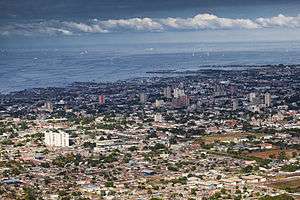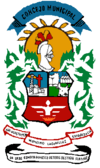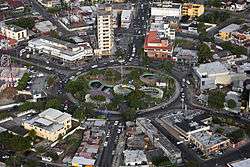Ciudad Ojeda
Ciudad Ojeda is a city located in the northeastern shore of Lake Maracaibo in Zulia State in northwestern Venezuela. Its population as of the 2005 census was listed as 128,941.
Ciudad Ojeda, Venezuela | |
|---|---|
 Panorama view of downtown San Matias area and Lake Maracaibo | |
 Flag  Seal | |
| Nickname(s): "La Ciudad Petrolera ", "'Ojeda'" | |
.svg.png) Ciudad Ojeda, Venezuela | |
| Coordinates: 10°12′0″N 71°18′0″W | |
| Country | Venezuela |
| State | Zulia |
| Counties | Lagunillas Municipality |
| Demonym | Citojense |
| Government | |
| • Mayor | Leonidas Gonzalez (2017–2021) |
| Area | |
| • Total | 975 km2 (376 sq mi) |
| Elevation | 5 m (16 ft) |
| Population (2005) | |
| • Total | 128,941 |
| • Density | 130/km2 (300/sq mi) |
| Postal code | 4019 |
| Area code | 265 |
| Climate | Aw |
| Website | Página web de la Alcaldía |
History

Ciudad Ojeda was founded on January 19, 1937 by former president Eleazar López Contreras as a settlement for the inhabitants of Lagunillas de Aguas[1] Today, it is a major center for the oil and gas industry in the Lake Maracaibo region.
On November 13, 1939 a terrible fire destroyed Lagunillas de Agua, causing over 200 fatalities. There are several hypotheses about the cause of the fire that prompted the final and decisive transfer of population to the mainland. The truth is that the oil industry was an oily layer on the lake, which had the potential to ignite the wooden houses built on stilts in the lake. One hypothesis is the accidental fall of a kerosene lamp to the lake from the Bar Caracas. Another is a fire caused by an oil company when he was going to beat his concession, that company helped reconstruction and retained the award after all, there is no evidence of this fact.[2]
Origin of the name
Ciudad Ojeda was named in honor of Alonso de Ojeda, the Spaniard who was the first European to discover Lake Maracaibo.
Population
Ciudad Ojeda is medium-sized among Venezuelan cities, with a population of approximately 130,000 inhabitants. The majority of Citojenses are of Venezuelan origin. It is also home to numerous foreign communities of Italian, Portuguese, Chinese and Arabs who have the biggest commercial businesses in the city.
Places of interest
- Iglesia de Santa Lucia (Church of Santa Lucia)
- Casa de la Cultura (House of Culture)
- Muro de contencion del Lago de Maracaibo (Containment Wall of the Lago de Maracaibo)
- Plaza Alonso de Ojeda (Alonso de Ojeda Square)
- Plaza Simón Bolívar (Simón Bolívar Square)
- El Mural Más Grande (The Biggest Mural)
Colleges and universities
- Universidad Alonso de Ojeda - (Uniojeda)
- Universidad Nacional Experimental Rafael María Baralt - (UNERMB)
- Instituto Universitario Pedro Emilio Coll - (IUTPEC)
Notable natives
- Denyse Floreano - Miss Venezuela 1994
- Eddie Pérez, former Major League Baseball player